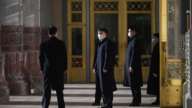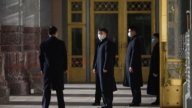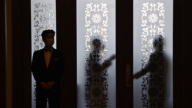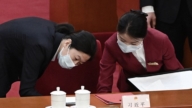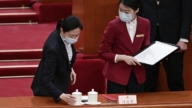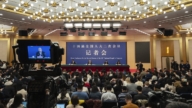【新唐人2012年3月9日讯】4号,中共副总理李克强出席中共政协无党派和社科联组会议,政协委员、苏州大学宪法学教授杨海坤在会上作了5分钟即席发言,阐述关于政治体制改革的想法,博得全场热烈掌声,但当局在报导中却删除了这一段。
当晚,《财经》杂志副主编罗昌平在微博发贴子说,李克强出席了今天的政协分组会议,15位政协委员发言,杨海坤是最后一位,他即席举手要求5分钟发言,呼吁推进政改,建议中央能够研究出台有关政治体制改革的总体方案,博得热烈掌声。新闻联播报导了这个会场,却过滤了此段。罗昌平呼吁,应该让杨海坤的声音传递出来。
当晚杨海坤在接受媒体采访时说:如果没有政治体制改革,经济体制的改革也不可能真正成功。他说,关于政治体制的改革他以前写过提案,这次没有。
广州中国问题学者巩胜利指出,中国谈改革已谈了30多年,但在中共一党专制下等于是空谈,再高的呼声它也会马上给你压下去。
巩胜利:“中国的改革啊,尤其在政治改革方面,几乎是原地没动,这个改革关系到几个方面,一个是执政党的权力,它的权力其本是认为不可动摇的,在这样的框架下你改什么啊? 中国62年来到现在,从来没有表示过老百姓的意见,它所谓的人大也好,党代表也好,都是他指定的,你想想看,这样的环境下它怎么改革?”
5号,中共总理温家宝在工作报告中近70次提到改革,他许诺要减缓经济增长速度,对农民的土地权提供更好的保障。据香港报纸的统计,温家宝的讲话只赢得26次掌声,创历史新低。
巩胜利:“温家宝是提倡改革喊的最响的一个,就在前几天他召开的国务院会议上,加速这个改革那个改革,他8年来都没改革成,快走人啦,就是这个15号之后人大就要选举了,那么18号左右温加宝就要走人了,他的改革还能改革成什么呢?”
两会前夕,中国各地100多名公民联名在网上向中共两会政协、人大及十八大建言,要求建立官员财产申报制度。
这份建言书,再次呼吁国家领导人率先公布财产,以示自身清廉和反腐、反贪决心,建言书还特别呼吁习近平率先示范。当局没有对此做出任何回应,但提出建言者却被禁声,众多支持这项建言的签名者也被当地公安警告。
维权律师唐荆陵:“这个我几年前就做过了,这个国家腐败这么严重,这个‘阳光法案’执行多年不能实现的情况下,我们不能老是等待,公民不能老是无谓的等待,必须行动起来。公民得把自己的意愿,自己的看法说出来,像政治领导者公布他本人和他的直系亲属的财产状况,这是防止腐败的一个很重要的方法。”
前《新华社》记者高瑜指出,两会就是一个权贵大会,它和民间的呼声背道而驰。
高瑜:“你看现在这个代表大会上,不就是一个权贵大会嘛,有钱的和当官的,人大主要是当官的,政协主要是富起来的,…地位都很尊贵的,在共产党的眼里都是这种人,才能被它们请到去协商,所以在这个问题上和整个民间的,还有知识界的一些呼吁呢,他是背道而驰的。”
另外,今年两会代表们五花八门的的雷人提案,比往届推陈出新,如:卖淫合法化、18岁可以结婚、农村儿童不鼓励上大学、港珠澳大桥塑建“和谐女神”、公民建道德档案、禁止公款消费茅台酒、穷人二胎指标转赠富人等… 。
独立参选人姚立法指出,两会的召开,本是庄严大事,却被这些代表们拿来愚弄社会,戏耍民众,亵渎人民赋予他们的权利,这样的人做人大代表,真是中国的一大悲剧。
—————-
A “Two Meetings” talk on political reform presented by
Li Keqiang was ignored in official reports.
On March 4th, the CCP’s executive vice premier, Li Keqiang,
attended the meeting for non-partisan and
Social Sciences Association committees of
the Political Consultative Conference (PCC).
During the meeting, a Suzhou University professor of
constitutional law, Yang Haikun,
made an impromptu five minute lecture describing
his personal opinions on political reform.
Though his talk received warm applause,
it was not mentioned in the official report.
On the evening of March 4th, the vice chief editor of Finance
Magazine, Luo Changping, wrote on his Weibo microblog
that, in the PCC sectional meeting which Li Keqiang had
attended, fifteen committees spoke and Yang Haikun was
the last speaker; during his five minute impromptu talk,
he called for political reform and advised the authority
to draft a general outline for the reform based
on research work.
Though Yang’s words aroused warm applause, the CCTV
news reported the meeting without mentioning him.
Luo Changping remarked that Yang’s voice should be heard
by the public.
In an interview after the meeting, Yang Haikun said that
there will be no real success in economic reform without political reform.
He mentioned that he had submitted relevant proposals
before, but not this time.
A Guangzhou Scholar, Gong Shengli, pointed out that
discussions on political reform have continued for over 30
years in China, but they all turned out to be empty talk
under the CCP’s one-party dictatorship.
No matter how strongly the Chinese people demand reform,
the party has attempted to suppress all voices.
(Gong Shengli): “We have hardly seen any progress
in China’s reform, especially in politics. There are several aspects of this problem.
One is that such reform touches upon the ruling party’s
power, which the CCP protects at any cost.
How can you reform anything under such framework?
The CCP has never taken Chinese people’s will seriously
since it grabbed power 63 years ago.
The so-called representatives, in all Party organizations,
are assigned by the authority. Just imagine, could any reform happen in this case?”
On March 5th, the CCP’s premier, Wen Jiabao, delivered the
government work report in which he mentioned the word “reform” 70 times.
He also promised to slow down economic development
and provide better protection of peasants’ land usage rights.
According to a Hong Kong newspaper’s report, Wen’s talk
was applauded 26 times in total, reaching a historical low.
(Gong Shengli): “Wen Jiabao is probably
the loudest advocate for reform.
Just days ago, he still discussed reforms of ‘this and that’
in the State Council meetings.
He failed to reform during the past eight years and will step
out of office very soon.
We all know that the People’s Congress will run another round
of elections on March 15th and Wen will leave his job around the 18th.
It has been even more impossible for him to do anything.”
Before the “Two Meetings,” over 100 Chinese citizens made
a joint statement on the Internet to the People’s Congress,
the Political Consultative Conference and the 18th National
Congress.
They demanded the establishment of a reporting system
of officials’ properties.
The statement called for the national leaders to prove their
determination in anti-corruption by taking the lead to disclose their properties.
It specifically suggested that Xi Jinping be the first.
The authority didn’t officially respond to the statement,
nevertheless the admonishers were silenced.
Many supporters were also given warnings by local security
bureaus.
(Human rights laywer Tang Jingling): “I did something
similar several years ago.
As the corruption becomes worse and the ‘Sunshine laws’
have been unable to be carried out for years, we can’t wait any more.
The citizens can’t always wait forever. We have to take action,
and express our true wills and opinions.
The property disclosure of political leaders
and their relatives is a good way to stop corruption.”
The former Xinhua journalist, Gao Yu, remarked that
the “Two Meetings” is a meeting of power and wealth, which stands against the people’s wills.
(Gao Yu): “Have a look at the so-called ‘representative
meetings,’ you will find that these are for power and wealth.
The People’s Congress mainly benefits the high-rank officials
and the Political Consultative Conference is for wealth.
In the CCP’s opinion, they are ‘high-level’ people, otherwise
they wouldn’t be invited to join the ‘Consultation’.
In this sense, the representatives stand mostly against
ordinary civilians or intellectual advocates.”
Furthermore, this year’s “Two Meetings” proposals
are even more ridiculous than previous ones.
Such proposals include “Prostitution legislation”,
“Set marriage age to 18”,
“Not encouraging rural students to attend college”,
“Building a statue of Harmony at the
Hong Kong-Zhuhai-Macao Bridge”,
“Establish documents to record citizen’s moral history”,
“Forbid purchase of Maotai (liquor) with public funding”
and “permission for the poor to sell second-child to the rich.”
Independent candidate Yao Lifa remarked that, though
the “Two Meetings” should be solemn and important,
it has always been treated as a tool to fool the society
and dupe the people by the representatives.
Their disrespect towards Chinese people’s will and betrayal
to the role of people’s representatives is a huge tragedy for China and its people.
NTDTV reporters Bai Mei, Zhu Zhishan, Li Yun and Sun Ning


